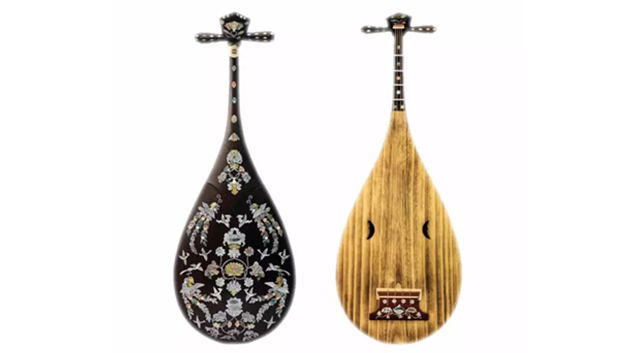The difference between the five-stringed lute and the four-stringed lute
2842 views · Organized by 爱在西元 on 2022-02-25
Pipa can be divided into five-string Pipa and four-string Pipa. At present, there are very few people who play the five-stringed lute, and most people choose to play the four-stringed lute. So, what are the differences between the five-stringed pipa and the four-stringed pipa?

1. The five-stringed pipa has a greater advantage than the four-stringed pipa when it expresses intense emotion and majestic momentum. Because there is one more string than the four-stringed pipa, the players of the five-stringed pipa can fully demonstrate the grand scene that the music wants to express.
2. The four-string pipa is better than the five-string pipa in expressing delicate emotions. Since the fifth string does not exist, there is no interference from the reverberation, so the four-stringed pipa can better highlight the strength and weakness, and can bring people a deeper feeling.
3. The popular age is different. The five-stringed pipa was popular from the Southern and Northern Dynasties to the Sui and Tang Dynasties, and in the Song Dynasty, almost all people switched to the four-stringed pipa. The four-stringed pipa became popular after the Song Dynasty. So far, the number of users of the four-stringed pipa still greatly exceeds the number of users of the five-stringed pipa.
The difference between the five-stringed pipa and the four-stringed pipa is that the five-stringed pipa was popular between the Southern and Northern Dynasties to the Sui and Tang Dynasties and could better express the magnificent momentum; the four-stringed pipa became popular after the Song Dynasty and could better express feelings; The number of people who use the pipa far exceeds the number of people who use the five-string pipa.
Involving musical instruments
The five-stringed pipa (pinyin wǔ xián pí pá) is an ancient Chinese plucked stringed musical instrument. Referred to as "five strings". The five-stringed pipa has a long history and unique shape. It was popular in the vast Central Plains of my country during the Tang Dynasty, and spread to Japan, becoming a historical witness of Sino-Japanese cultural exchanges.
Guess you like
Organized by 夜夜 on 2022-03-21
A concert that links the tradition, the present and the future. You open the door of the theater and walk into the music hall filled with youth. The melody of Chinese music and the second dimension is perfectly intertwined and hovering above the theater dome.
read >>
Organized by 一杯清酒 on 2022-03-18
This pipa, which has been passed down for thousands of years, was only displayed because of the handover of the throne; it is also a cultural relic from China, which has witnessed the unique cultural relationship between China and Japan.
read >>
Organized by 爱在西元 on 2022-03-01
Pipa is a very traditional musical instrument in my country. Pipa can be found in many of our literary works and unearthed cultural relics. Until today, for many friends who learn musical instruments, Pipa is also one of the most popular music in folk music. an important instrument.
read >>
Organized by Fucui on 2022-02-25
Pipa is one of the main national musical instruments in my country and one of the most artistically expressive plucked instruments.
read >>
Organized by 线性代数 on 2022-02-09
The five-stringed pipa is an ancient Chinese plucked stringed musical instrument. Referred to as "five strings". The Chinese five-stringed pipa has a long history and unique shape. It was popular in the vast Central Plains of China during the Tang Dynasty, and spread eastward to Japan, becoming a historical witness of Sino-Japanese cultural exchanges.
read >>

 渝公网安备 50010702504639号
渝公网安备 50010702504639号